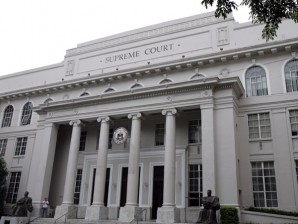SC issues TRO vs cyber law
MANILA, Philippines–The Supreme Court stopped for 120 days the implementation of the Cybercrime Prevention Act of 2012.
At the same time, the high court has set an oral argument on January 15 to hear both parties for and against the law.
In a 13-page ruling, the high court consolidated all the 15 petitions against the Cybercrime Law.
“Now, therefore, effective immediately and for a period of 120 days, you, respondents, your agents, representatives or persons acting in your place or stead are hereby enjoined from implementing and/on enforcing Republic Act 10175 (Cybercrime Prevention Act of 2012),” the high court resolution dated Oct. 9 stated.
At the same time, it ordered the government’s lawyer, the Solicitor General to comment within 10 days on the petitions filed against the law.
The high court also set the case for oral argument on Jan. 15 at 2pm.
In the 15 separate petitions, these are the provisions of the Cybercrime Prevention Law that are being questioned before the high court;
Sec. 4(c)(4), which criminalizes libel, not only on the internet, but also on “any other similar means which may be devised in the future;”
Sec. 5 (b), which punishes those who attempt, aide or abet the commission of a cyber offense;
Sec. 6, which raises by one degree higher the penalties provided for by the Revised Penal Code for all crimes committed through and with the use of information and communications;
Sec. 7, which provides that, apart from prosecution under the law, any person charged for the alleged offense covered will not be spared from violations of the Revised Penal Code and other special laws;
Sec. 8, penalties corresponding Section 5 (b)
Sec. 11 which lists duties of law enforcement authorities, including the submissions of “timely and regular reports including pre-operation, post-operation and investigation results and such other documents as may be required to the DoJ;
Sec. 12, which authorizes the real-time collection of traffic data;
Sec. 13, authorizes law enforcement authorities to collect or record, by technical or electronic means, traffic data in real-time;
Sec. 15, authorizes law enforcement authorities to search, seize and examine computer data;
Sec. 17, which authorizes service providers and law enforcement agencies to “completely destroy the computer data subject of a preservation and examination” order;
Sec. 19, which authorizes the DOJ to block access to computer data when such data “is prima facie found to be in violation of the provisions of this Act;” and
Sec. 20, which states that those who fail to comply with provisions of Chapter IV (Enforcement and Implementation), specifically orders from law enforcement agencies, shall face imprisonment of prision correctional (6 months and 1 day to 6 years) in its maximum period or a fine of P100,000 or both, for each noncompliance;
Sec. 21, which states the jurisdiction of Regional Trial Courts (RTC) and designated cybercrime courts over violations of any of the provisions of the law; and
Sec. 22 pertaining to international cooperation from all relevant international instruments, international arrangements, and domestic laws in the implementation of RA 10175.
Petitioners said the law violates the public’s constitutional rights including right to due process, equal protection, freedom of speech, right to privacy, protection against unreasonable searches and seizures, protection against double jeopardy, among others.
“Indeed, the Internet is not evil per se, but the statute in question views cyberspace as inherently evil and treats those who use it in violation of a rule with unjust discrimination by providing a penalty higher than an act committed without the use of an internet,” one of the petition stated.
The law is envisioned as a measure against hacking, identity theft, spamming, cybersex and online child pornography. But citizens and groups who protested on social networking sites, blogs and out in the streets fear politicians will use it to silence critics.
The law contains a provision that says libel — which is already punishable by up to six years in prison — is also a cybercrime. It doubles cumulative penalties for online offenses and allows government agencies to search, seize and destroy computer data deemed libelous.
Human rights and media groups have unsuccessfully campaigned for years to downgrade libel from a criminal to a civil offense, saying politicians often use the law to harass journalists and other critics.
Many Facebook and Twitter users in the Philippines and the portals of the main media organizations have replaced their profile pictures with black screens as a protest against the law. With Associated Press















